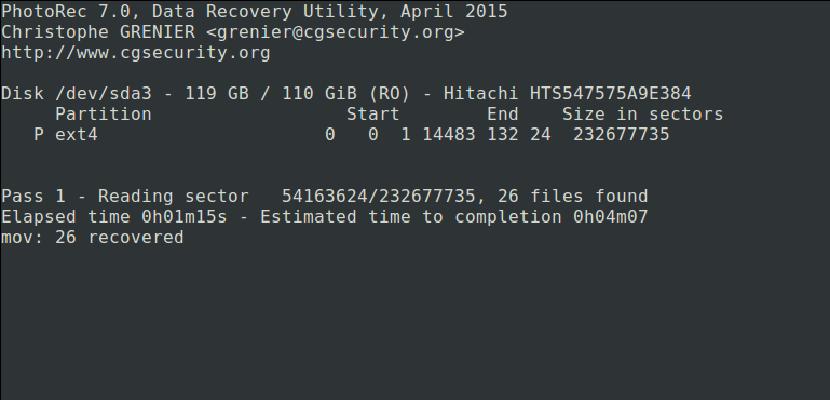
Either by mistake or by thinking that the information we delete is no longer necessary, there comes a time when the need arises to have to retrieve that information. If you only sent to the recycle bin, you have the opportunity to recover that information in a simple way.
But things change when the information is "permanently" deleted, even though at first glance it is not possible to recover that information deleted from the system, the reality is different, since In Linux we have some tools that can help us with this.
TestDisk

TestDisk is a free software data recovery utility licensed under the terms of the GNU General Public License (GPL).
It was designed primarily to help recover lost data storage partitions and / or make non-bootable disks bootable again when these are caused by buggy software, certain types of viruses, or human error (such as accidentally deleting a partition table).
TestDisk check BIOS or operating system to find hard drives and their characteristics (LBA size and geometry by cylinder head sector).
TestDisk does a quick check of your disk structure and compares it to your partition table for input errors. If the partition table has input errors, TestDisk can repair them.
Installation
To install it, you can search for the application in the Ubuntu Software Center or from the terminal with the following command:
sudo apt install testdisk
PhotoRec

PhotoRec is a software designed to recover lost files including videos, documents and files from hard drives and CDRoms as well as lost images (hence the name PhotoRecovery) of the memories of cameras, MP3 players, PenDrives, etc.
This application ignore the file system and do a deep search of the data, working even if your file system is badly damaged or has been reformatted.
This is a free and open source multiplatform application distributed under the GNU General Public License (GPLV v2 +).
Installation.
This tool comes together with TestDisk so you must install it, only to run PhotoRec you must run the following command in terminal:
sudo photorec
Scalpel

This tool is based on Foremost an open source application dDeveloped to recover deleted information, Scalpel is significantly faster and more efficient Using the File Carving technique "reading the database, headers, footers" of a set of image files or device files.
The tool visits the storage database of each block and identifies the files deleted from it and recovers instantly. Apart from file recovery it is also useful for digital forensic investigation.
Installation
To be able to install this tool, just type in the terminal:
sudo apt-get install scalpel
Ddrescue

Ddrescue is a Linux tool designed to copy data from one device from one file block to another. This tool will help you in rescuing the data when the drive is suffering from read errors.
Unlike many of the tools on this list, This will use your running Ubuntu partition without resorting to having to save the data to another location. So, to rescue the data, you will have to attach the problem disk to the Linux working machine.
Ddrescue is a program originally born to be used in the terminal, although recently some graphical interfaces such as DDRescue-GUI have emerged that make it easier to use.
Though the main disadvantage is that it is very slow. Therefore, depending on the amount of information to be retrieved, the tool may take days to complete this process.
Installation
In order to install this utility, you can search for it with the help of Synaptic or simply type the following command in the terminal:
sudo apt-get install gddrescue